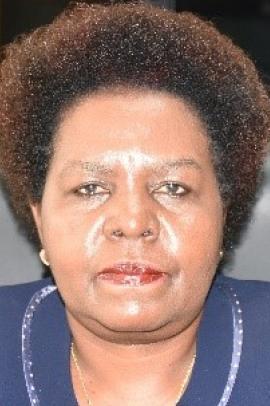Dr. Margaret Maimba has a Ph.D (Environmental Planning), UoN, 2020; MSc (Geochemistry), University of Leeds, UK, 1988; and BSc (Geology & Chemistry), UoN, 1984. She has over 30 years of professional experience in both administrative and technical sectors. These range from the versatile field of Geochemistry where she has set footing into exploration of Geothermal Energy and minerals; advising the Government on policies; promotion of ST&I in matters environment; coordination conferences / workshops / seminars; review of research proposals for purposes of clearance and authorization; contributing professional expertise in various Boards of Management and government policy documents. One of the major achievements is the establishment of the Kenya Space Agency domiciled at the Ministry of Defence. Margaret has also represented the NCST/NACOSTI, and Ministry in charge of ST&I in various scientific and technical fora at the local, regional and international level. In Public administration, Margaret, have been in active and result-oriented participation for over 15 years. Her acumen and leadership skills have seen her serve in the Geological Society of Kenya (she is Fellow of GSK); Geologists Registration Board (served as the Deputy Chairperson); represented the Chief Executive (NCST/NACOSTI) in various Boards of Management (e.g. KMFRI, KARI, KEFRI, Kenya Science Teachers College, ACTS etc.). She has been the Chairperson of National Science Week from 2017-2019. Outside the public life, Margaret has been the chairperson and has supported the empowerment of disadvantaged members of the society. She is widely travelled locally, regionally and internationally with wide exposure in human relations.

Project Summary
The Sustainability of Computer E-Waste Disposal Management Approaches in Nairobi City County, Kenya
Research Supervisors
- Prof. Peter M. Ngau
- Dr. Fridah Mugo
Computer e-waste is the fastest growing solid waste stream (SWS) in the world. It is harmful to human health and environment because of the hazardous nature of its contents. It creates a major disposal management challenge especially in the low-income countries. The study identified computer e-waste disposal management (CEDM) approaches; examined potential risks to human health and environment; assessed level of public awareness on potential effects; and explored possible environmental governance for its sustainability. businesses, ministries and agencies (MAs), disposal sites and households provided data for the study which was then analysed using SPSS. The findings revealed that MAs dispose of the e-waste through auction, throwing away into SWS, and donation; business sell to e-waste collectors, donate and lease out; households use storage, throw away into SWS, donate, sell as 2nd hand material and to recycling facility; e-waste pickers use urban mining and open-air burning; yard shop operators sell to local industries and export market. The level of public awareness on human health and environmental effects of CEDM approaches was low. All the approaches used except recycling by WEEE Centre were found to be unsustainable. The study recommends the creation of a CEDM Authority or a department created at the Communication Authority of Kenya or Nairobi County Office to implement a Zero Computer E-waste Policy. The policy will provide for establishment of: Residential/Commercial/Neighbourhood Computer e-waste drop-off points, County computer e-waste recycling centre, and Ward computer literacy centre for Community computer literacy capacity building.
Links
- http://internationalscholarsjournals.org/journal/ajewm/articles?index=4
- http://pubs.sciepub.com/jephh/7/1/4/index.html
- http://uonjournals.uonbi.ac.ke/ojs/index.php/ahr/issue/view/91
- http://uonjournals.uonbi.ac.ke/ojs/index.php/ahr/issue/view/83
